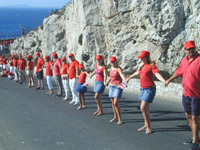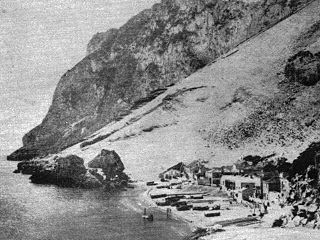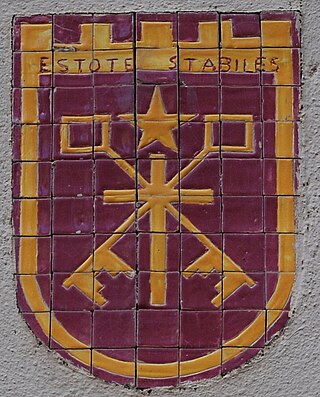
Demographic features of the population of Gibraltar include ethnicity, education level, health of the populace, economic status, religious affiliations and other aspects.
The Andalusian dialects of Spanish are spoken in Andalusia, Ceuta, Melilla, and Gibraltar. They include perhaps the most distinct of the southern variants of peninsular Spanish, differing in many respects from northern varieties in a number of phonological, morphological and lexical features. Many of these are innovations which, spreading from Andalusia, failed to reach the higher strata of Toledo and Madrid speech and become part of the Peninsular norm of standard Spanish. Andalusian Spanish has historically been stigmatized at a national level, though this appears to have changed in recent decades, and there is evidence that the speech of Seville or the norma sevillana enjoys high prestige within Western Andalusia.

Llanito or Yanito is a Romance dialect. It is a mix of English and Spanish, laced with words from other languages, such as Ligurian; it is spoken in the British overseas territory of Gibraltar. It is commonly marked by a great deal of code switching between Andalusian Spanish and British English and by the use of Anglicisms and loanwords from other Mediterranean languages and dialects.

The culture of Gibraltar reflects Gibraltarians' diverse origins. While there are Spanish and British influences, a result of the territory's status as a British overseas territory and its proximity to Spain, the ethnic origins of most Gibraltarians are a mix of Andalusian Spaniards, Genoese, Maltese, Portuguese and British. The main religion is Christianity, the majority group being the Roman Catholic Church, then the Church of England. There is a long established Sephardic Jewish community, a number of Hindu Indians and a Moroccan Muslim population. Gibraltarians of Genoese origin came to The Rock in the 18th century, with the Maltese and Portuguese following in the 19th century, coming to work and trade in the British military base. Spanish Andalusian origins are the result of generations of intermarriage with inhabitants of surrounding towns.

The English language in Europe, as a native language, is mainly spoken in the United Kingdom and Ireland. Outside of these states, it has official status in Malta, the Crown Dependencies, Gibraltar and the Sovereign Base Areas of Akrotiri and Dhekelia. In the Netherlands, English has an official status as a regional language on the isles of Saba and Sint Eustatius. In other parts of Europe, English is spoken mainly by those who have learnt it as a second language, but also, to a lesser extent, natively by some expatriates from some countries in the English-speaking world.
Gibraltarian status is a legal status in Gibraltar law defined by the Gibraltarian Status Act, 1962. Persons with Gibraltarian status are registered on the Register of Gibraltarians.

Gibraltar is a British Overseas Territory and city located at the southern tip of the Iberian Peninsula, on the Bay of Gibraltar, near the exit of the Mediterranean Sea into the Atlantic Ocean. It has an area of 6.7 km2 (2.6 sq mi) and is bordered to the north by Spain. The landscape is dominated by the Rock of Gibraltar, at the foot of which is a densely populated town area, home to some 32,688 people, primarily Gibraltarians.

The sole official language of Gibraltar, a British overseas territory, is English, which is used by the Government and in schools. The eponymous Gibraltarian English accent is spoken in the territory.

Gibraltarian cuisine is the result of a long relationship between the people of Spanish Andalusia and those of Great Britain, as well as the many foreigners who have made Gibraltar their home over the past three centuries. These influences include those of the culinary traditions of Malta, Genoa, and Portugal. This marriage of tastes has produced in Gibraltar an eclectic mix of Mediterranean and British cuisines.

Gibraltarians are an ethnic group native to Gibraltar, a British overseas territory located near the southernmost tip of the Iberian Peninsula at the entrance to the Mediterranean Sea.

Peninsular Spanish, also known as the Spanish of Spain, European Spanish, or Iberian Spanish, is the set of varieties of the Spanish language spoken in Peninsular Spain. This construct is often framed in opposition to varieties from the Americas and the Canary Islands.

Samuel G. Benady MBE MB, FRCP, DCH is a Gibraltarian historian, novelist and retired paediatrician of Sephardic Jewish descent. He has been a regular contributor to the Gibraltar Heritage Trust's Journal, and lecturer in the Gibraltar Museum, and author of several works related to the history of Gibraltar and also works of fiction. According to the Gibraltar Chronicle, Benady is "Gibraltar’s well known and prolific author".

Genoese Gibraltarians have existed in Gibraltar since the 16th century and later became an important part of the population. It is an ethnic community made up of descendants of Genoese and Ligurians who emigrated to Gibraltar during the Italian diaspora. The population of Gibraltar with Genoese surnames is around 20% of the total.

The Port of Gibraltar, also known as Gibraltar Harbour, is a seaport in the British Overseas Territory of Gibraltar. It was a strategically important location during the Napoleonic Wars and after 1869 served as a supply point for ships travelling to India through the Suez Canal. The harbour of Gibraltar was transformed in the nineteenth century as part of the British Government's policy of enabling the Royal Navy to defeat its next two largest rival navies combined. Both Gibraltar and Malta were to be made torpedo proof, and as a result the North and South Mole were extended and the Detached Mole was constructed. Three large dry docks were constructed and plans were available by 1894. Over 2,000 men were required and had to be billeted in old ships which had not been required since convict labour was abandoned. The demand for stone and sand necessitated building the Admiralty Tunnel right through the Rock of Gibraltar.

The Christian Brothers School was a school in the British Overseas Territory of Gibraltar. The school was a technical school in the 1930s and in 1950 became the Gibraltar Grammar School until comprehensive education was introduced in the 1970s. The building was then home to the Sacred Heart Middle School but was no longer run by the Congregation of Christian Brothers. In July 2015, the Sacred Heart Middle School became the Saint Bernard's Middle School and moved to a different location. The building was renovated and now houses Prior Park School, Gibraltar's first co-educational, Catholic independent secondary school. Prior Park School is the fourth school in the Prior Park family, the other three being located in Bath and Wiltshire, UK.
Laurel J. Brinton is an American-born Canadian linguist.

M. G. Sanchez is a Gibraltarian writer who has written over a dozen books on Gibraltarian identity. His works have been reviewed in literary journals in Europe and the United Kingdom and he has lectured at many universities.
Donna Mary Brinton is an American applied linguist, author, and global educational consultant on second language education. She is the daughter of Mary Mies Brinton and Robert K. Brinton and the sister of epidemiologist Louise A. Brinton and linguist Laurel J. Brinton.
Sonja L. Lanehart is an American linguist and professor of linguistics in the College of Social and Behavioral Sciences at the University of Arizona who has advanced the study of language use in the African American community. Her work as a researcher, author, and editor includes African American English, education, literacy, identity, language variation, women's languages, intersectionality, and inclusivity within the African American community. Lanehart's sociolinguistic orientation prioritizes language as a phenomenon influenced by sociocultural and historical factors. She also utilizes the perspectives of Critical Race Theory and Black feminism in her work. Lanehart was the Brackenridge Endowed Chair in Literature and Humanities at the University of Texas at San Antonio from 2006 to 2019, and was selected by the Linguistic Society of America as a 2021 Fellow.
Alexander Thomas Bergs is a German linguist and professor of English linguistics at the University of Osnabrück.













